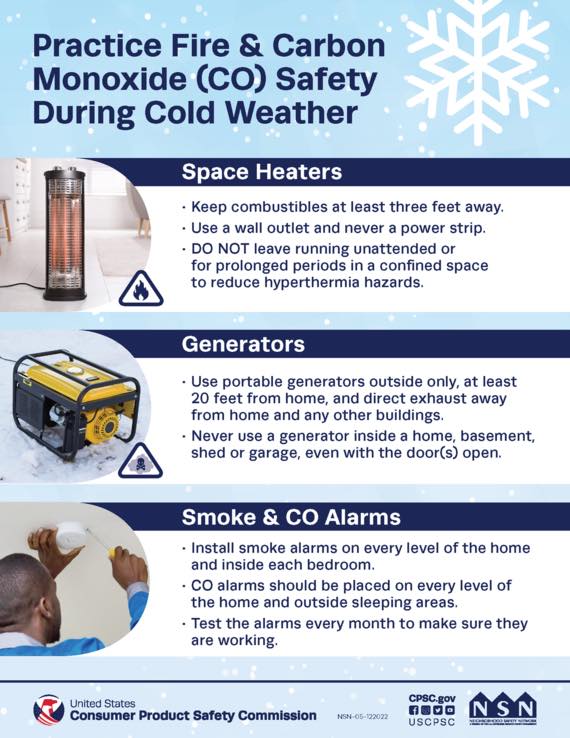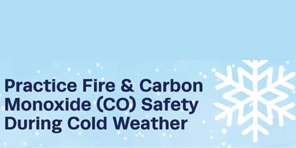WASHINGTON, D.C. — As winter weather grips much of the country, the U.S. Consumer Product Safety Commission is warning consumers about deadly hazards from home heating equipment, including space heaters, furnaces and fireplaces.
Two hazards of special concern are fires and carbon monoxide (CO) poisoning, and although these deadly hazards impact all populations, they disproportionally affect certain communities. According to CPSC’s 2017 to 2019 Residential Fire Loss Estimates report, African Americans have the highest rate of fire deaths, nearly twice the overall rate across the population. In addition, African Americans represent 23 percent of portable generator-related CO deaths, 186 from 2011-2021.
CPSC urges consumers to take safety precautions while keeping their home warm this winter.
Portable Heaters
CPSC estimates that portable heaters, including electric space heaters, were involved in an average of 1,700 fires per year, resulting in an average of 70 deaths and 160 injuries annually from 2017 to 2019.
Portable heaters can cause fires if they are placed too close to combustible materials, such as drapes, furniture or bedding, so make sure to place them at least three feet away from these materials. Always plug electric space heaters directly into a wall outlet and never into an extension cord or power strip, to prevent overloading and causing a fire. Never leave portable heaters on while sleeping. Fuel-burning portable heaters should never be refueled while in use. Turn the heater off, and allow it to cool down before refueling.
A CPSC staff report found that portable heaters can also present a hyperthermia (overheating) hazard to consumers, particularly children, people with disabilities and senior citizens, who may be more susceptible because of their limited ability to act or react to the elevated ambient temperature. Hyperthermia can result in death. Don’t leave portable heaters running unattended in a confined space around infants or individuals with reduced physical, sensory or mental capabilities.
Furnaces, Fireplaces and Chimneys
Have a professional inspect all fuel-burning heating systems, including furnaces, boilers, fireplaces, wood stoves, water heaters, chimneys, flues and vents each year.
Fireplaces can cause fires if the chimney is cracked, blocked or coated with creosote, or if sparks and embers reach flammable materials. CPSC estimates that fireplaces and chimneys were involved in and average of 15,800 fires per year, resulting in an average of 20 deaths and 50 injuries annually from 2017 to 2019.
Fuel-burning heating systems, including furnaces and fireplaces, are a potential source of CO, which is an odorless, colorless and poisonous gas known as the “invisible killer.” These heating systems can cause CO poisoning if they are improperly installed, poorly maintained, have defective or blocked venting systems or are misused.
Generators
A gasoline-powered generator used during winter weather-related power outages can produce as much CO as hundreds of cars. CPSC estimates that from 2011-2021, more than 800 people died from CO poisoning associated with generators, over 103 in 2020 alone, a record number that is expected to climb as CPSC is still receiving data for that year.
Use portable generators outside only and place them at least 20 feet from the home with exhaust pointed away from any nearby building. Never use a generator inside a home, basement, shed or garage.
Never refuel a generator while it is running. Turn it off, and allow the generator to cool down before refueling.
Use flashlights instead of candles
During a power outage, use battery-powered flashlights or lanterns, rather than candles, to light the home. If candles are used, never leave them burning unattended.
Smoke and CO Alarms
Working smoke and CO alarms save lives! Install smoke alarms on every level of the home and inside each bedroom. CO alarms should be placed on every level of the home and outside sleeping areas. Alarms should be battery operated or have battery backup in case of a power outage. Interconnected alarms are best because, when one sounds, they all sound.
Test the alarms every month to make sure they are working. Replace batteries at least once every year, or install smoke and CO alarms with sealed, 10-year batteries.
Check for recalled products
Before using household products as the colder weather arrives, check to see if the products have been recalled at www.cpsc.gov/recalls. If a product has been recalled, stop using it immediately and contact the recalling company for the remedy–a refund, repair or replacement.


